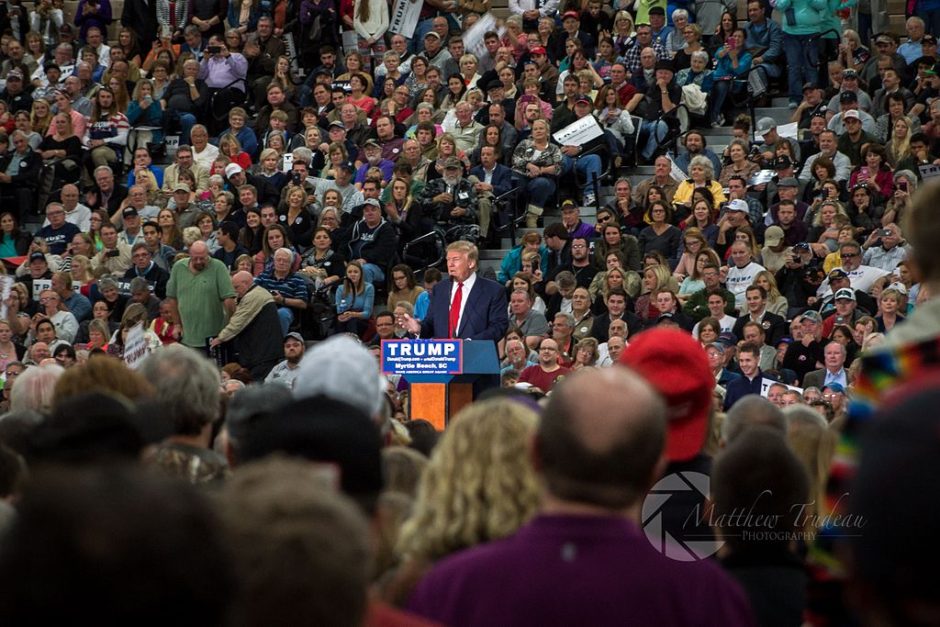Donald Trump won the presidency of the United States as a disrupter of received convention. Judging by his first official meeting with Israeli Prime Minister Benjamin Netanyahu in Washington, D.C. on February 15, the newly-inaugurated president has no intention of changing his disruptive and confusing style.
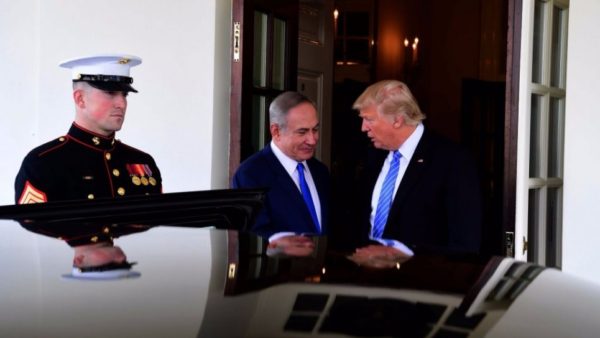
At a joint news conference with Netanyahu prior to their White House summit, Trump was asked whether he was committed to a two-state solution to resolve Israel’s conflict with the Palestinians. Reiterating his aim is to achieve “a really great peace deal,” which has eluded both sides, Trump said he would support whatever agreement they reached.
“I’m looking at two-state and one-state, and I like the one both parties like,” he said, adopting a laissez-faire attitude to peace. “I can live with either one.”
In enunciating this nebulous formula, Trump puzzled observers. Had he abandoned the longstanding U.S. position that Palestinian statehood in the West Bank and the Gaza Strip is the optimum method of breaking the bitter impasse between Israel and the Palestinians? Was he heretically calling for a binational state?
For a while, no one quite knew.
But then the U.S. ambassador to the United Nations, Nikki Haley, stepped into the void. On February 16, she claimed in no uncertain terms that the United States still supports a two-state solution. “Anybody that wants to say the United States does not support the two-state solution — that would be an error,” she said. “We absolutely support the two-state solution, but we are thinking out of the box as well.”
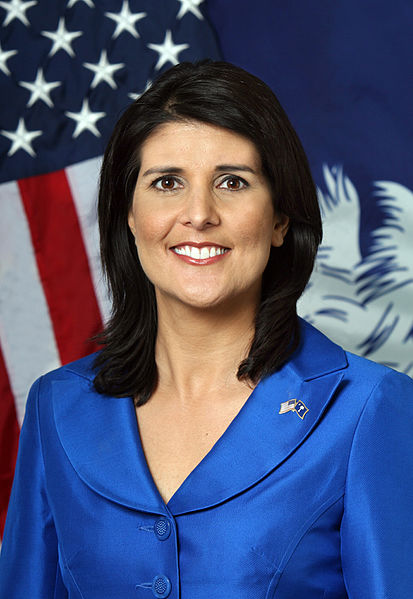
Haley’s comments triggered yet more speculation about the two-state option, which is supported by most Israelis, many Palestinians, much of the Arab world and the majors powers.
Bill Clinton was the first American leader to informally endorse the concept of a territorially viable Palestinian state. He did so following the virtual collapse of the 1993 Oslo peace process and the outbreak in September 2000 of the more violent second Palestinian uprising in the West Bank and Gaza.
Clinton’s predecessors, George Bush, Ronald Reagan and Jimmy Carter, were not as bold as Clinton, going no further than supporting Palestinian self-determination.
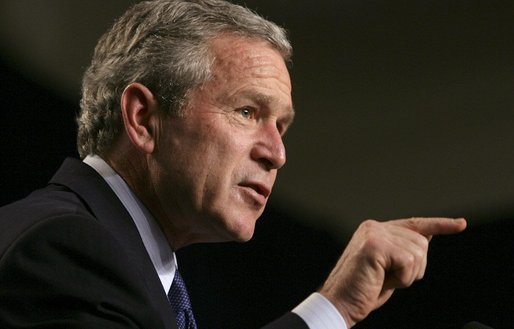
Bush’s son, George W., was the first president to officially back a two-state solution. In 2002, during the most violent year of the intifada, Bush spelled out his vision of “two states, living side by side in peace and security.” Bush tried to flesh out his vision through peace negotiations, but his efforts floundered.
His successor, Barack Obama, was an ardent advocate of the two-state solution. He and his secretary of state, John Kerry, worked tirelessly on behalf of it. In 2010, they convinced Netanyahu to agree to a partial building freeze in existing Israeli settlements in the West Bank. And in 2013, they persuaded Israel and the Palestinian Authority to relaunch bilateral peace negotiations. Both methods failed.
In the meantime, Israel tightened its grip on the West Bank by building a separation barrier that jutted into Palestinian lands, expanding settlements and tolerating the construction of unauthorized outposts.

Trump entered office favorably disposed toward Israel, suggesting he would adopt a lenient attitude toward settlements and would move the U.S. embassy in Tel Aviv to Jerusalem.
Emboldened by Trump’s comments, Netanyahu approved the construction of some 6,000 new homes in the West Bank and East Jerusalem. Two of Netanyahu’s ministers, Education Minister Naftali Bennett and Justice Minister Ayelet Shaked, warned him to desist from expressing public support for Palestinian statehood.
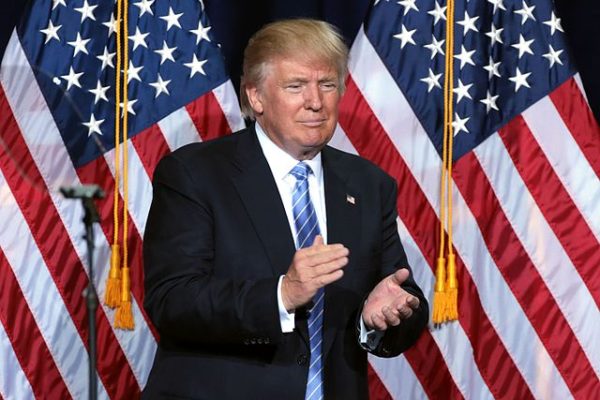
Netanyahu voiced support for a demilitarized Palestinian state in a speech at Bar-Ilan University in the winter of 2009, shortly after Obama’s accession to power. Netanyahu, however, paid little more than lip service to the concept as he continued to expand Israel’s presence in the West Bank and assured supporters that Palestinian statehood was a non-starter.
Earlier this week, Public Security Minister Gilad Erdan, one of Netanyahu’s closest allies, confirmed that Netanyahu is against the establishment of a Palestinian state. As Erdan put it in an interview, “I think all members of the security cabinet, and foremost the prime minister, oppose a Palestinian state. No one thinks in the next few years that a Palestinian state is something that, God forbid, might or should happen.”

At yesterday’s press conference in Washington, Netanyahu tellingly dodged reporters’ questions as to whether he is still committed to Palestinian statehood. But he insisted he had not changed his mind about it. “I have been very consistent about that,” he falsely claimed.
Netanyahu reiterated that the Palestinians must recognize Israel as a Jewish state and accept Israeli military control over the West Bank before a peace accord can be signed.
Trump’s apparent willingness to consider an alternative to a two-state solution has been balm to right-wing Israeli politicians, who’ve insisted on the inclusion of the West Bank into Israel.
Bennett, having called for the annexation of 60 percent of the West Bank, was in a celebratory mood as Trump seemed to distance himself from Palestinian statehood. Claiming that a “new era” in Israeli-American relations had begun, he tweeted, “After 24 years, the Palestinian flag was lowered today from the staff and replaced by an Israeli flag.”
Erdan struck the same note. “The positions expressed by the (U.S.) president are evidence that the two-state solution is not the only solution to reach peace, and that the moment has arrived to change the equation and exert pressure on her Palestinian side.”
Within hours of meeting Trump, Netanyahu rejected annexation: “I don’t want to annex close to 2.5 million Palestinians to Israel. I do not want them to be our subjects.”
In adopting this position, Netanyahu parted ways with the president of Israel, Reuven Rivlin, who recently suggested that Palestinians should be granted Israeli citizenship if Israel annexes the West Bank. “Applying sovereignty to an area gives citizenship to all those living there,” Rivlin said in reference to the Palestinians of the West Bank. “There is no [separate] law for Israelis and for non-Israelis.”
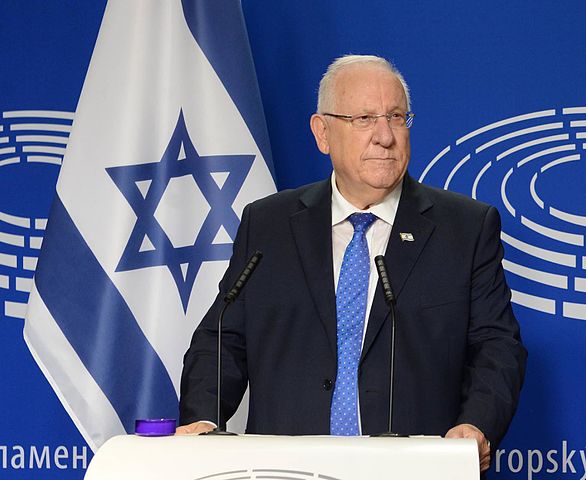
Rivlin has dismissed critics’ concerns that the absorption of several million Palestinians will dilute and compromise Israel’s Jewish complexion and thus turn Israel into a binational state — an objective supported by Iran and promoted by the PLO before it embraced a two-state solution.
Since Netanyahu fears the prospect of a binational state, what exactly does he have in mind?
He has talked about a regional approach to peace, of forging a rapprochement with conservative Sunni Arab countries like Saudi Arabia and Qatar before the Palestinian problem can be formally addressed. But there’s a fly in the ointment. These states, which like Israel share a common fear of Iran, are unlikely to recognize Israel, or deal openly with the Jewish state, unless the Palestinians achieve independence within the boundaries of a contiguous state.
At an Arab League summit in 2002, Saudi Arabia offered blanket Arab recognition of Israel upon its withdrawal from the occupied territories and its acceptance of a Palestinian state. Israel rejected the Saudi plan and its amended version five years later.
